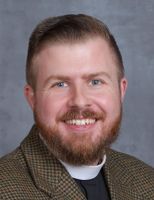By Peter Schellhase
•
August 10, 2025
Sermon for Sunday, August 10, 2025. The sermon refers to the readings given for the day: Genesis 15:1-6; Hebrews 11:1-3, 8-16; Luke 12:32-40 Abram is childless, despite God’s promise him that his descendants would inherit the land. Right now his default heir is not even a relative; it is his hereditary steward, Eleazar of Damascus. The fundamental question is this: Can Abram trust God to do what he said? One thing we notice in this story is that Abram does not in any way try to get God off the hook for his apparently impossible promise, like we so often do: “Maybe I should understand this metaphorically instead of literally” (of this, more anon); or even, as indeed Abram later says of his son with Hagar: “O that Ishmael might live before thee.” No—He takes God’s promise literally, and believes what it says. If you have read Genesis, you know how this story turns out. 15–25 years after this conversation, God follows through, not only for Abram, but ultimately for all of Abram’s descendants. What is important in this moment is that, seeing none of this as yet, the writer of Genesis says, “Abram believed the Lord, and he reckoned it to him as righteousness.” This is one of those places where the writer of Genesis puts a definite spin on the ball. We are to understand Abram’s faith in a specific way, as that which makes him righteous before God. This statement is all the more interesting because the immediate context has apparently nothing to do with righteousness, only with the promise of offspring. However, in the broader context, God’s covenant with Abraham and his descendants has everything to do with how a chosen people may live before God in righteousness. Right from the beginning, faith, not the keeping of a law or ethical code, is shown to be the crucial matter. Indeed, Abram’s worst ethical failures are related to his lack of faith, his failure at various times to believe that God is really going to come through for him. The Epistle lesson from Hebrews puts a finer point on the problem. What about all those people who died believing in God’s promises, but did not see them come to pass in their lifetimes? Abram at least got to see the birth of his promised son, Isaac. But he did not see Isaac’s own sons and grandsons, nor did he see the multitude of their descendants inherit the land which God had promised. Nor, indeed, did he see their exile and return, nor the birth of the Son who is both the author and the fulfiller of his promises. The preacher to the Hebrews reminds them that Abram is one of many chosen by God to receive his promises, who do not seem to see them realized. God’s timelines are very long, and our lifetimes are comparatively short. Often the blessings and favor we ourselves receive are fruit of the hard and faithful work of our parents and grandparents of which we now enjoy the benefits. But to be truly happy, Abram must ultimately see these things with his own eyes. This is where the understanding of eternal life and the ultimate resurrection comes in. Those who have, as Hebrews says, “died in faith, not having received what was promised, but having seen it and greeted it from afar” will themselves perfectly enjoy all that was promised, that they received beforehand by faith. Even today, the children of Abraham hope for very specific promises to be fulfilled. These promises involve actual land, geographic territory in the world. Theirs is no abstract utopian ideal. The Zionist movement in the late 19th and early 20th century was a novel political movement, but one based on a very ancient premise which the Jews have carried with them ever since God called Abraham out of Mesopotamia: God promised that they would possess this land and dwell in it. The scripture teaches us that we, too, are children of Abraham. Our claim to this is not based on direct lineage. Ours is the heritage of Abram’s faith, on account of which he was judged righteous before God and worthy of God’s promises. We are not looking for an earthly but a heavenly land and city. But before we dismiss the earthly hopes of the Jews as having nothing to do with us, think about what I just said. Have any of us really renounced all worldly hopes for ourselves and our descendants? I really doubt this. I certainly have not. I wish and hope for a righteous and peaceful world for my children to grow up in. The state of New York doesn’t feel like that kind of a place to me, but ultimately my hope is not in governors or presidents or even in my fellow citizens, but in God, who is sovereign over all of these. It’s not un-Christian to hope for good in this world. Jesus himself taught us to pray “Thy kingdom come on earth as it is in heaven.” Christians do not hope only for “pie in the sky by and by” as some deride us. Pie, yes. Sky, not exactly. We believe that in the end Jesus will return to this earth from which he ascended and make all things right and good. Even before that, we believe that we are called to do the work of his kingdom here and now. So while our ultimate homeland is the heavenly Jerusalem which we do not yet see, we are fully invested in the time and place in which we find ourselves now, and especially in that place where the Kingdom of God finds its fullest expression on earth: the Church. For me this points obviously to the place where we are gathered right now: St. Michael’s Church. As we seek to love and follow Jesus as part of this congregation, we are all, I think, confronted by the distressing fact that St. Michael’s is in a serious state of decline, and has been for a really long time. And we have to seriously ask the question of how long we will be able to continue with our work and mission as a parish since our present way of being is not sustainable. Maybe here is where we can connect personally with the story of Abram. At the time of this narrative he was between 75 and 85 years old, and Sarai his wife was only 10 years younger. Too old by any reasonable standard to have a child. And yet Isaac was born 15-25 years later, when Abraham was 100 years old and Sarah 90. For us, in 15—25 years it is reasonable to presume that this present congregation will not exist. It has been said that the Church grows not primarily by natural generation but by adoption. Jesus is both the offspring of Abraham and God’s only begotten Son; we are brothers and sisters adopted in him. As Jesus said, “God is able of these stones to raise up children for Abraham.” So while I may be at risk of spiritualizing the point, our hope as a congregation is not that a multitude of children may be born to us, but that a multitude of persons who are not now part of our congregation may be brought in. This is the work in which we may participate through evangelism. This work should not be limited to but should certainly include our own children and extended family members. I encounter so many people who were raised here and have fond memories of the place, but have not attended church in many years, and have raised their own children functionally outside the faith. Shall we hope for the return of those who have chosen to live as exiles from the faith of their childhood? Yes, we should pray for their return. Those who have left the faith are often more difficult to reach than those who have never heard the gospel. They need, more than another invitation, a work of grace to revive their own faith and love toward God. But what God requires of us in this situation is not (primarily) action. For Abram, as scripture says, “as good as dead,” only faith could bridge the gap between the impossibility of his circumstances and the promises of God. I close with the words of Jesus, who gives us in today’s gospel a program for how we are to live faithfully in the meantime. “Fear not, little flock, for it is your Father’s good pleasure to give you the kingdom. Sell your possessions, and give alms; provide yourselves with purses that do not grow old, with a treasure in the heavens that does not fail, where no thief approaches and no moth destroys. For where your treasure is, there will your heart be also.” Some of you, I will say, are doing precisely this, with your generous and faithful support of St. Michael’s church, both with your time and your finances. I can’t but think that you are investing in eternity, because as an investment in the here and now it would make little sense. May you reap in due time the reward of your faith, both in this time and in the age to come. For others, I would encourage you to ask yourself: Do the ways in which I spend my time and my wealth reflect a heart of faith? Or is my treasure bound up in the things of this world which are passing away? And again, the treasures that are most precious to God are his disciples, his “little flock.” It is for their sake, for love of them, that Jesus exhorts them to adopt an attitude of readiness. And it is also for the sake of those who do not yet know him, or who have strayed from his ways, that he tarries, in order that they also may be gathered in to he fold. This is the opportunity we have been given now. Time draws short. Let us prepare.




